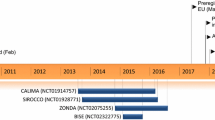Abstract
Mepolizumab (Nucala®) is a fully humanized monoclonal antibody against interleukin-5 (IL-5) that is being developed by GlaxoSmithKline. Subcutaneous mepolizumab is approved in the USA for the add-on maintenance treatment of patients aged ≥12 years with severe asthma and an eosinophilic phenotype, and is awaiting approval in the EU. Mepolizumab blocks IL-5 and reduces blood and sputum eosinophil counts in patients with asthma. In the phase III MENSA trial in patients with recurrent asthma exacerbations and evidence of eosinophilic inflammation despite high-dose inhaled glucocorticoid therapy, mepolizumab significantly reduced the annualized exacerbation rate. In the phase III SIRIUS trial, mepolizumab had an oral glucocorticoid-sparing effect in patients with severe eosinophilic asthma requiring systemic glucocorticoid maintenance therapy. This article summarizes the milestones in the development of mepolizumab leading to this first approval for severe asthma with an eosinophilic phenotype.
Similar content being viewed by others
References
Smith DA, Minthorn EA, Beerahee M. Pharmacokinetics and pharmacodynamics of mepolizumab, an anti-interleukin-5 monoclonal antibody. Clin Pharmacokinet. 2011;50(4):215–27.
Chung KF. Defining phenotypes in asthma: a step towards personalized medicine. Drugs. 2014;74(7):719–28.
Walford HH, Doherty TA. Diagnosis and management of eosinophilic asthma: a US perspective. J Asthma Allergy. 2014;7:53–65.
Food and Drug Administration. FDA approves Nucala to treat severe asthma. 2015. http://www.fda.gov/NewsEvents/Newsroom/PressAnnouncements/ucm471031.htm. Accessed 6 Nov 2015.
European Medicines Agency. Nucala (mepolizumab): summary of opinion. 2015. http://www.ema.europa.eu/docs/en_GB/document_library/Summary_of_opinion_-_Initial_authorisation/human/003860/WC500194118.pdf. Accessed 13 Oct 2015.
GlaxoSmithKline. GSK submits Japan regulatory application for mepolizumab in severe eosinophilic asthma [media release]. 2015. http://www.gsk.com. Accessed 15 Oct 2015.
Food and Drug Administration. Search orphan drug designations and approvals. 2015. http://www.accessdata.fda.gov/scripts/opdlisting/oopd/OOPD_Results_2.cfm. Accessed 15 Oct 2015.
European Medicines Agency. Public summary of opinion on orphan drug designation: mepolizumab for the treatment of Churg-Strauss syndrome. 2013. http://www.ema.europa.eu/docs/en_GB/document_library/Orphan_designation/2013/04/WC500141553.pdf. Accessed 15 Oct 2015.
European Medicines Agency. Public summary of opinion on orphan designation: mepolizumab for the treatment of hypereosinophilic syndrome. 2010. http://www.ema.europa.eu/docs/en_GB/document_library/Orphan_designation/2009/10/WC500006418.pdf. Accessed 15 Oct 2015.
GlaxoSmithKline. Regulatory update: mepolizumab for the treatment of hypereosinophilic syndrome (HES) [media release]. 2009. http://www.gsk.com. Accessed 12 Oct 2015.
GlaxoSmithKline. Nucala (mepolizumab) for injection, for subcutaneous use. 2015. https://www.gsksource.com/pharma/content/dam/GlaxoSmithKline/US/en/Prescribing_Information/Nucala/pdf/NUCALA-PI-PIL.PDF. Accessed 6 Nov 2015.
Pouliquen IJ, Kornmann O, Barton SV, et al. Characterization of the relationship between dose and blood eosinophil response following subcutaneous administration of mepolizumab. Int J Clin Pharmacol Ther. 2015;53(12):1015–27.
Büttner C, Lun A, Splettstoesser T, et al. Monoclonal anti-interleukin-5 treatment suppresses eosinophil but not T-cell functions. Eur Respir J. 2003;21(5):799–803.
Leckie MJ, ten Brinke A, Khan J, et al. Effects of an interleukin-5 blocking monoclonal antibody on eosinophils, airway hyper-responsiveness, and the late asthmatic response. Lancet. 2000;356(9248):2144–8.
Flood-Page P, Swenson C, Faiferman I, et al. A study to evaluate safety and efficacy of mepolizumab in patients with moderate persistent asthma. Am J Respir Crit Care Med. 2007;176(11):1062–71.
Flood-Page PT, Menzies-Gow AN, Kay AB, et al. Eosinophil’s role remains uncertain as anti-interleukin-5 only partially depletes numbers in asthmatic airway. Am J Respir Crit Care Med. 2003;167(2):199–204.
Stein ML, Villanueva JM, Buckmeier BK, et al. Anti-IL-5 (mepolizumab) therapy reduces eosinophil activation ex vivo and increases IL-5 and IL-5 receptor levels. J Allergy Clin Immunol. 2008;121(6):1473-83, 83.e1-4.
Garrett JK, Jameson SC, Thomson B, et al. Anti-interleukin-5 (mepolizumab) therapy for hypereosinophilic syndromes. J Allergy Clin Immunol. 2004;113(1):115–9.
Flood-Page P, Menzies-Gow A, Phipps S, et al. Anti-IL-5 treatment reduces deposition of ECM proteins in the bronchial subepithelial basement membrane of mild atopic asthmatics. J Clin Invest. 2003;112(7):1029–36.
Menzies-Gow A, Flood-Page P, Sehmi R, et al. Anti-IL-5 (mepolizumab) therapy induces bone marrow eosinophil maturational arrest and decreases eosinophil progenitors in the bronchial mucosa of atopic asthmatics. J Allergy Clin Immunol. 2003;111(4):714–9.
Haldar P, Brightling CE, Hargadon B, et al. Mepolizumab and exacerbations of refractory eosinophilic asthma. N Engl J Med. 2009;360(10):973–84.
Nair P, Pizzichini MM, Kjarsgaard M, et al. Mepolizumab for prednisone-dependent asthma with sputum eosinophilia. N Engl J Med. 2009;360(10):985–93.
Haldar P, Brightling CE, Singapuri A, et al. Outcomes after cessation of mepolizumab therapy in severe eosinophilic asthma: a 12-month follow-up analysis. J Allergy Clin Immunol. 2014;133(3):921–3.
Pavord ID, Korn S, Howarth P, et al. Mepolizumab for severe eosinophilic asthma (DREAM): a multicentre, double-blind, placebo-controlled trial. Lancet. 2012;380(9842):651–9.
Ortega HG, Liu MC, Pavord ID, et al. Mepolizumab treatment in patients with severe eosinophilic asthma. N Engl J Med. 2014;371(13):1198–207.
Bel EH, Wenzel SE, Thompson PJ, et al. Oral glucocorticoid-sparing effect of mepolizumab in eosinophilic asthma. N Engl J Med. 2014;371(13):1189–97.
Rothenberg ME, Klion AD, Roufosse FE, et al. Treatment of patients with the hypereosinophilic syndrome with mepolizumab. N Engl J Med. 2008;358(12):1215–28.
Roufosse F, de Lavareille A, Schandene L, et al. Mepolizumab as a corticosteroid-sparing agent in lymphocytic variant hypereosinophilic syndrome. J Allergy Clin Immunol. 2010;126(4):828-35.e3.
Roufosse FE, Kahn J-E, Gleich GJ, et al. Long-term safety of mepolizumab for the treatment of hypereosinophilic syndromes. J Allergy Clin Immunol. 2013;131(2):461-7.e1-5.
Duncan EA, Ortega H, Gleich G, et al. Observational experience describing the use of mepolizumab in paents with hpereosinophilic syndrome [abstract no. 257]. Am J Respir Crit Care Med. 2015;191:A1365.
Kim S, Marigowda G, Oren E, et al. Mepolizumab as a steroid-sparing treatment option in patients with Churg-Strauss syndrome. J Allergy Clin Immunol. 2010;125(6):1336–43.
Gevaert P, Van Bruaene N, Cattaert T, et al. Mepolizumab, a humanized anti-IL-5 mAb, as a treatment option for severe nasal polyposis. J Allergy Clin Immunol. 2011;128(5):989-95.e1-8.
Author information
Authors and Affiliations
Corresponding author
Ethics declarations
Disclosure
The preparation of this review was not supported by any external funding. During the peer review process the manufacturer of the agent under review was offered an opportunity to comment on the article. Changes resulting from any comments received were made by the author on the basis of scientific completeness and accuracy. Gillian Keating is a salaried employee of Adis, Springer SBM.
Additional information
This profile has been extracted and modified from the AdisInsight database. AdisInsight tracks drug development worldwide through the entire development process, from discovery, through pre-clinical and clinical studies to market launch and beyond.
Rights and permissions
About this article
Cite this article
Keating, G.M. Mepolizumab: First Global Approval. Drugs 75, 2163–2169 (2015). https://doi.org/10.1007/s40265-015-0513-8
Published:
Issue Date:
DOI: https://doi.org/10.1007/s40265-015-0513-8




